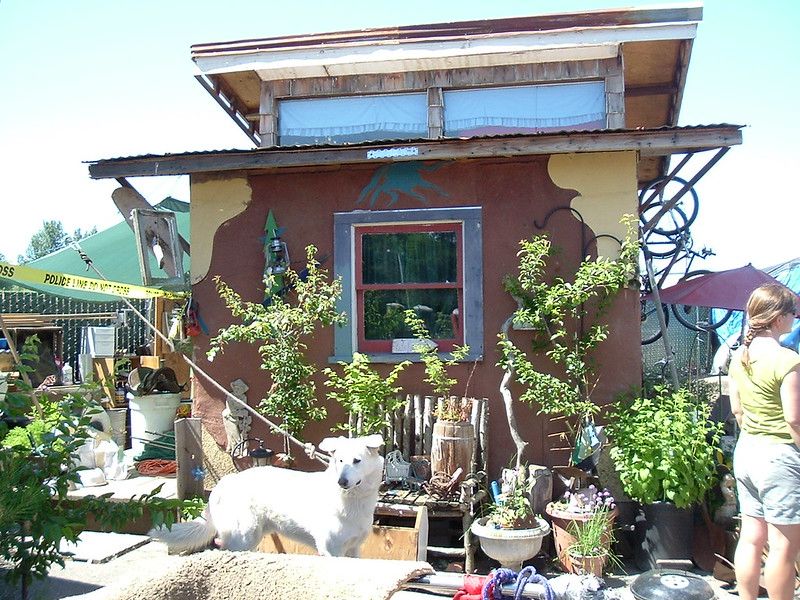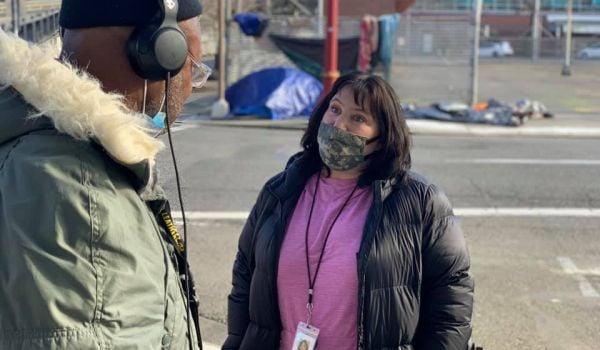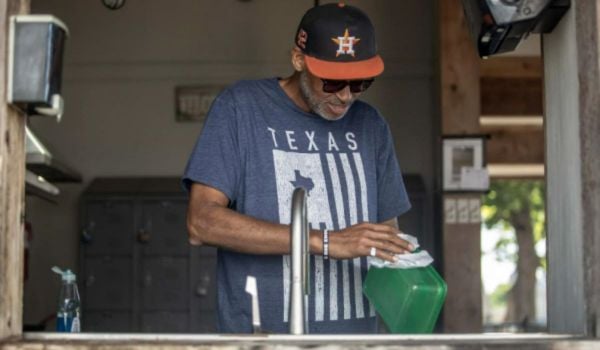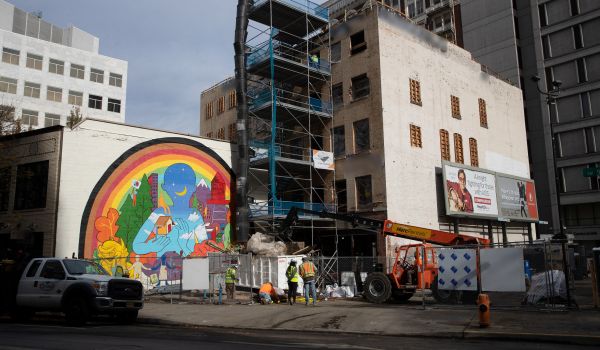Lisa Larson, 57, was left homeless after leaving an abusive relationship in Portland, Oregon, over a decade ago. She and her current partner, whom she met during this time, spent a year sleeping in abandoned houses, parks and public places, and were twice arrested for criminal trespassing. On the streets, they heard about a different kind of space for unsheltered people like themselves: a community by and for the unhoused with its own plot of land, sanctioned by the city but not run by it, a 40-minute bus ride from Portland’s downtown. They put their names on a waitlist and moved there in 2010. They’ve been at Dignity Village ever since.
Larson now serves as the village’s outreach coordinator and was elected to serve as the council’s vice chairwoman. The village, which was birthed over 20 years ago in response to the demands of unhoused activists, is the first sanctioned, self-run village for unhoused residents in the country. It remains one of very few communities of its kind in North America.
Residents in Dignity Village pay $75 a month to live there and put in 10 hours a week of work on village business, which includes cleaning, maintenance and paperwork. Residents of the village, which holds about 65 people and grows to about 80 people in the winter, abide by a small set of rules ratified by members. Violating those rules can lead to a temporary or, in worst case scenarios, lifelong ban. Residents can stay for as long as they like; the average stay is currently about a year and a half.
On Nov. 3, Portland’s city council approved an aggressive citywide camping ban as well as a plan to herd many of the city’s unsheltered residents into six sanctioned camps of 250 people each. By forcing people off of the streets, the plan could mean the village, which currently has a modest waitlist of three people, could be overwhelmed with requests. It could also lead many of the city’s unsheltered population to be jailed, forced into congregate shelter or driven away from the city.
It’s precisely the type of future Dignity Village was founded to avoid.
“I know a lot of people who don’t want to go to what they’re starting to already call internment camps,” Larson says. “To house that many people in a few small areas, it’s going to be insanity.”
A hostility toward encampments has ramped up since the beginning of the pandemic, as housing insecurity and social dislocation have led to an uptick in people sleeping outdoors. It’s a familiar scenario for Dignity Village, whose founding hearkens to an era 20 years ago when unhoused activists, sick of being scapegoated and harassed, made a largely successful stand for their own autonomy.
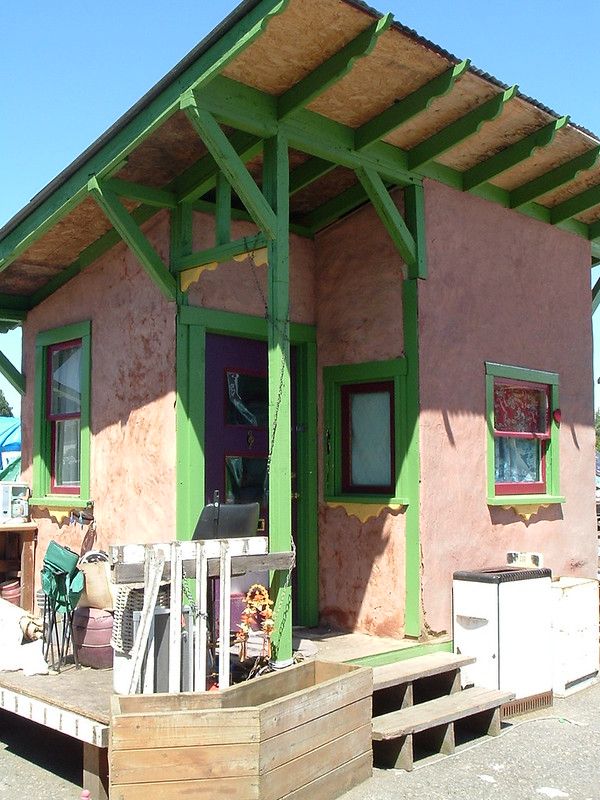
A Dignity Village home in 2005. (Photo by Cheryl / CC BY-NC-ND 2.0)
After a previous citywide camping ban was ruled unconstitutional in September of 2000, a group of unhoused people founded the “Out of the Doorways” movement, militantly opposing sweeps and asking the city to permit a self-governed tent city for unhoused people. The movement was supported by Street Roots, a Portland newspaper written by housed and unhoused journalists and sold by people experiencing homelessness.
An editor at Street Roots enlisted Mark Lakeman, an architect with an interest in community-run spaces and founder of the nonprofit The City Repair Project. Lakeman convinced the group that the term “village” would more clearly reflect the type of space they envisioned – and would be more well-received by the public.
In December of 2000, the residents of what was then called “Camp Dignity” placed themselves under the Fremont Bridge. For the next 10 months, the group was dispersed by police but continued regrouping, often intentionally doing so in crowded public spaces and near affluent development where standoffs could get the most attention, Lakeman says. Less than a year later, the city council permitted the group a fenced-in asphalt patch of land in its leaf-composting operation, a solution that was only approved for 60 days while the city council negotiated with residents on something more long-term, according to a New York Times report. The site was continually reauthorized, eventually becoming permanent, its tarpaulin tents upgraded to tiny homes.
The early village was a combination of DIY architecture, built by residents and Americorps volunteers and designed by Lakeman to be ecologically sound. The city added sewage lines, power and provided sanitation. The space was initially rented from the city, though land is now inhabited at no cost. The $75 that residents pay each month goes to maintenance and operations.
Todd Ferry, a researcher with Portland State University’s Homelessness Research and Action Collaborative, has studied Dignity and other villages it inspired (such as Opportunity Village in Eugene, Oregon). He says the city realized that by giving the community autonomy and providing support when needed it would save itself money and bureaucratic burden.
“It needs to have some support and needs to be able to stay but, no, the city largely stays out,” he says.
The community strives to be economically self-sufficient. Dignity has set up several recycling-based businesses with the city’s help, including an agreement wherein residents chop and sell excess wood provided by loggers. While the village had an advisory council, of which Lakeman was a member, it was dissolved years ago. Residents have been reluctant to accept any direct funding from the city and have rejected any attempt at sharing leadership from either elected officials or outside nonprofits. The village incorporated as a 501(c)3 to sign legal agreements with the city.
The city does pay for a single employee: a program specialist who helps with bookkeeping and administrative needs.
“We do not endorse the idea of an advisory council and see that as a failed structure,” program specialist Victory LaFara tells Next City. “We’ve been doing excellent with our own internally elected council and board officers. When the village is in need of consultants, I serve that role or I reach out for consultations when issues are outside of my expertise. Unlike an advisory council, I hold no power or purse strings over the Village. The Village is free from coercion to accept or reject my advice on its merits alone.”This role is the only one occupied by someone who does not live in Dignity Village; all of the community’s other needs are handled by residents as part of their 10 hours of work. Lakeman says this role was accepted reluctantly by members after the village ran into financial problems.
More recently, Larson says, the village recently applied for and has received several grants. She’s optimistic about their finances. “We’re actually sitting financially pretty solid right now,” she says. “Many years ago when I was treasurer, I was basically having to rob from Peter to pay Paul on every monthly bill.”
The village occasionally ejects residents who break community rules, but Larson says they try to give people the benefit of the doubt. These rules remain more or less unchanged two decades after the community’s founding: no fighting, no disruptive behavior. There was previously a stringent ban on alcohol and illicit drugs, but this prohibition has since been relaxed to accommodate the reality of people struggling with addiction, a change that required buy-in from the city. Now people are permitted to use drugs and alcohol in their own pods, so long as they don’t bring it out in the open.
“If you did not have a drug or alcohol problem before you hit the streets, by the time you find a place like Dignity Village, you probably do have a problem with it,” Larson says. She says residents help each other out with peer support and peer counseling for addiction.
The village has had its share of critics over the years, particularly in its early years. Some still criticize the site for not focusing on rapid rehousing or transitioning to permanent housing, although that is not the village’s stated goal. Residents can stay as long as they like: Larson and her partner have been there for 12 years, and another resident has been there for 17, she says. Mobile service providers from the nonprofit JOIN provide housing assistance for those who want it.
A crucial aspect of the village model is that residents have agency, Ferry says. The spaces are voluntary; residents can leave and there are few barriers to entry. It is hard to imagine any of these approaches being replicated in the planned 6 mega encampments the city is looking to build.
“These solutions have been tried, they don’t work,” Ferry says of the new camping ban. He says he studied the role that size plays in a successful village of unhoused people. According to his research, the ideal number of people to maintain community cohesion is 25.
“I do think that a village model with a reasonable number of people would be much more desirable than massive camps that are often compared by the houseless community to internment camps,” he says.
Lakeman says he’s met with Mayor Wheeler many times and walked him through the village model but found him evasive. “It’s been so frustrating,” he says. “Before you even create these hugely expensive and politically volatile villages, why not just help people where they are?”
Larson is disturbed by the city’s plan. She believes it will put more strain on Dignity Village and exacerbate problems for the rest of Portland’s unhoused community. She is even sympathetic to some of the complaints that have led to this moment: She sees RV campers proliferating and waste being left behind, but says there are better ways to handle it than to herd people into encampments.
She has friends still out on the streets, one of whom told her he’s prepared to go to jail rather than the city-run camp. “Everyone deserves a safe place to put their head at night, and a safe place to be. And those encampments are not going to be that safe, not with the amount of people that they have in them,” Larson says.
She sees no way for the city’s camps to offer residents any real control. “You know, you let the people make their own rules,” she says. “You let the people decide what direction their community is going to go in.”
This story has been corrected to reflect that Dignity Village’s advisory council has been dissolved and that the community does not support an advisory council-based structure at this time.
This article is part of Backyard, a newsletter exploring scalable solutions to make housing fairer, more affordable and more environmentally sustainable. Subscribe to our weekly Backyard newsletter.

Roshan Abraham is Next City's housing correspondent and a former Equitable Cities fellow. He is based in Queens. Follow him on Twitter at @roshantone.



